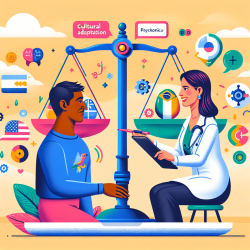Welcome to the World of Co-Produced Health Research!
As a Special Education Director, you are constantly seeking innovative ways to enhance the educational experiences of students with special needs. One approach gaining traction in the health and educational sectors is co-produced health research, which involves collaboration between patients, caregivers, and medical professionals. This blog explores the insights from the research article "An auto-ethnographic study of co-produced health research in a patient organisation: unpacking the good, the bad, and the unspoken," and how these findings can be applied to improve your practice.
What is Co-Produced Health Research?
Co-produced health research is a collaborative process where patients, caregivers, and medical professionals work together to define research questions, collect data, and analyze results. This approach is particularly beneficial in rare diseases where traditional research methods may not provide the necessary insights. The study conducted by Ketotic Hypoglycemia International (KHI) highlights the transformative power of this approach, especially in rare conditions like idiopathic ketotic hypoglycemia (IKH).
Key Findings from the Study
- Time and Work Investment: Both parents and medical professionals involved in KHI experienced pressure to contribute significant time and effort. This highlights the need for practitioners to balance their professional and personal commitments while engaging in co-produced research.
- Power Dynamics: The study found a shift in power dynamics, with medical experts learning from the lived experiences of parents. This reciprocal learning can enhance the quality of research and improve outcomes for students.
- Mental Health and Boundaries: Participants struggled with maintaining boundaries and safeguarding their mental health. Practitioners should prioritize self-care and establish clear boundaries to prevent burnout.
How Practitioners Can Apply These Insights
As a practitioner, you can leverage the findings from this study to enhance your skills and improve student outcomes:
- Embrace Collaboration: Foster a culture of collaboration by involving parents and caregivers in the research process. Their lived experiences can provide valuable insights and lead to more effective interventions.
- Prioritize Self-Care: Establish clear boundaries and prioritize self-care to maintain your mental health. Encourage your team to do the same to prevent burnout.
- Seek Funding and Support: Advocate for funding and resources to support co-produced research initiatives. This will enable you to create a sustainable framework for meaningful collaboration.
Encouraging Further Research
The study underscores the importance of co-produced research in improving health outcomes. As a practitioner, consider conducting further research in your field to explore the benefits of this approach. Collaborate with parents, caregivers, and medical professionals to identify research questions that address the unique needs of your students.
To read the original research paper, please follow this link: An auto-ethnographic study of co-produced health research in a patient organisation: unpacking the good, the bad, and the unspoken.










